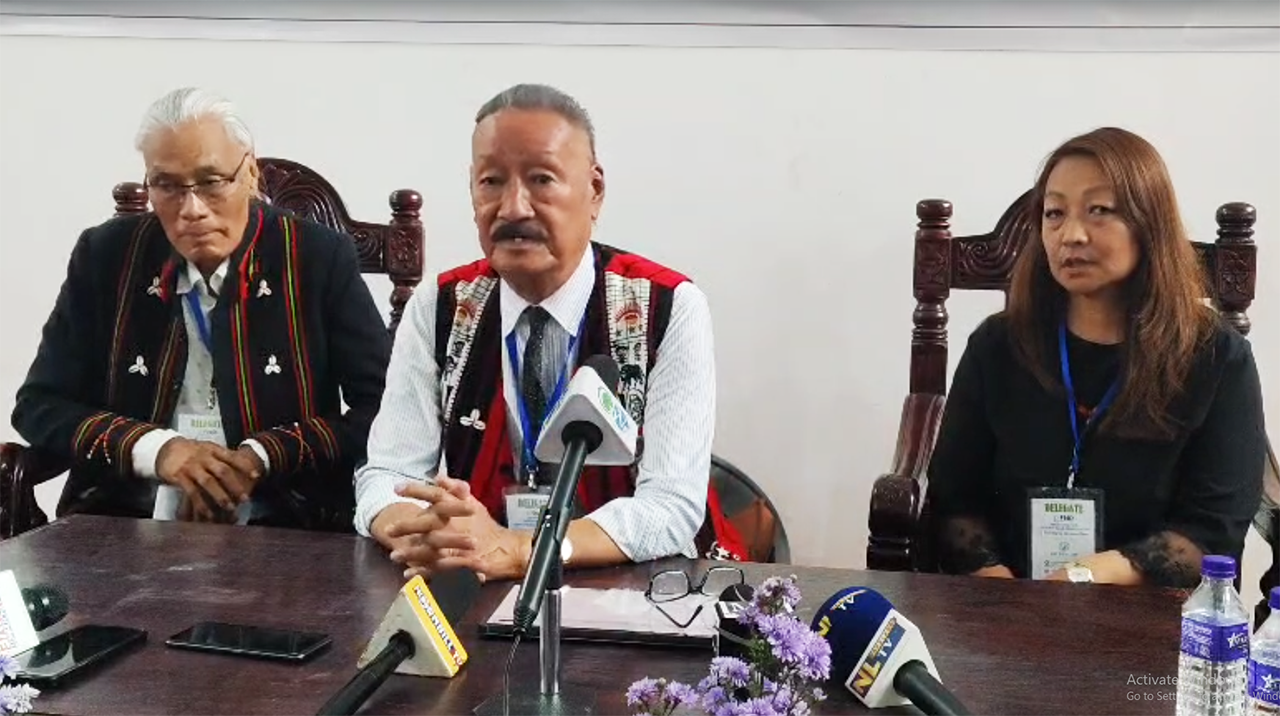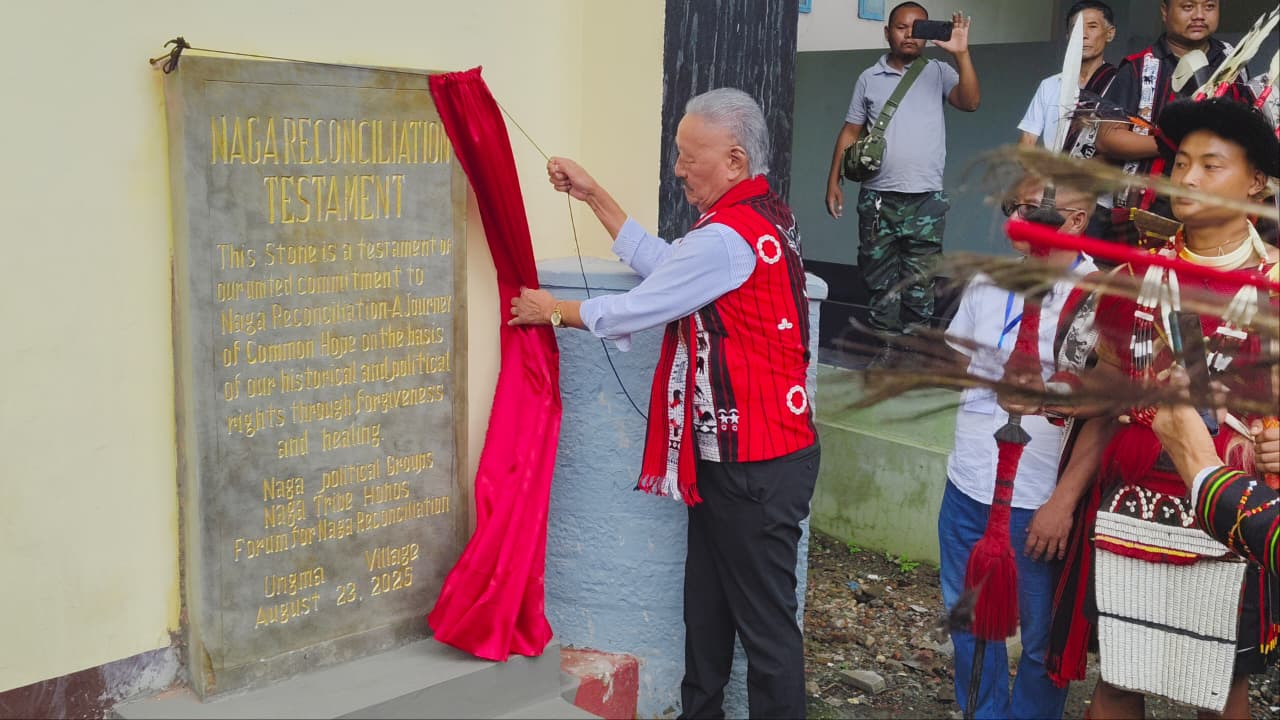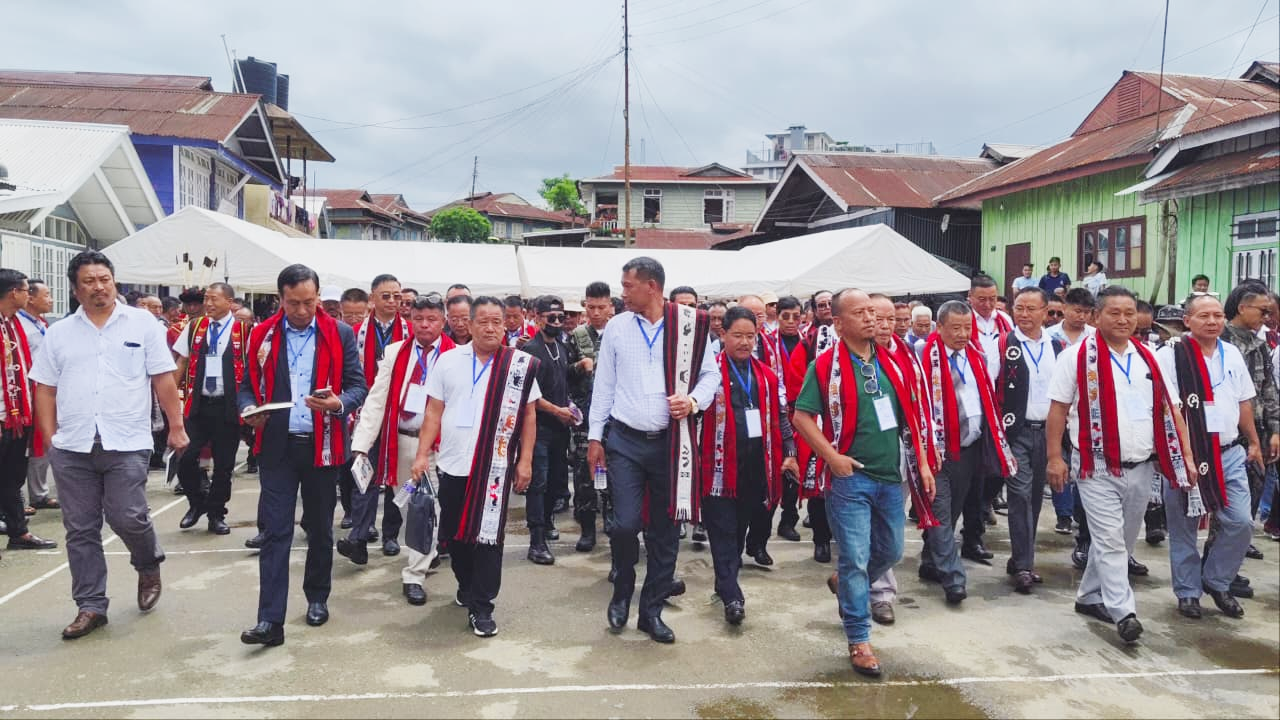A historic convergence of 16 Naga Political Groups (NPGs), 34 Naga Tribe Hohos from Nagaland, Manipur, Arunachal Pradesh, Assam, and the Forum for Naga Reconciliation (FNR) was held at Ungma Village on Saturday under the banner of the Council of Naga Cooperation and Relationship (CNCR). The meeting concluded with the adoption of the Ungma Statement, which declared August 23, 2025, as a “Winning Day” for the Naga people, marking it as a day of resolve, courage, and unity.
The Ungma Statement reaffirmed that all Naga Political Groups, with the support of the Tribe Hohos, will converge at a Common Ground to pursue a shared political vision based on the Naga people’s historical and political rights.
This vision, the statement said, is not merely inherited but continually affirmed through collective memory, struggle, and aspiration.
The declaration stressed that the convergence must take place without preconditions and without rationalized narratives that divide and fragment unity. Instead, the way forward was described as a “tangible horizon shaped by the courage to reconcile, the wisdom to listen, and the will to act.”
The statement further affirmed that this declaration was not a procedural outcome but a covenant before God. It stated that no group would undermine the oath taken in the name of the Naga people, describing the CNCR as a platform of moral clarity and responsibility.
It emphasized that the Naga people’s collective choice is to rise above fragmentation and division, embrace forgiveness and healing, honor the sacrifices of past generations, and walk together toward a future of dignity, justice, and peace. The unity expressed was described as sustained by conviction, shared sacrifice, and hope for collective flourishing.
Download Nagaland Tribune app on Google Play

Concluding the declaration, the signatories stated: “On this day, August 23, 2025, at Ungma Village, Nagaland, we, the representatives of the NPGs, Tribal Hohos, and the FNR, declare this statement as a binding affirmation of our shared commitment to the dignified wholeness of the Naga people. Let this be remembered as the day the Naga people chose convergence over fragmentation, vision over rhetoric, and future over fear. Therefore today we confess and declare that Nagas are one. God be our help.”
Opening remarks was delivered by Rev Dr Wati Aier, Convenor of the FNR, followed by an indoor open discussion moderated by Aier, where NPGs and Tribe Hohos were invited to share views on unity and the pursuit of a shared political vision. The outcome of the meeting, which is the “Ungma Statement” was later shared with the media during the press conference.
Aier and Sanyü stress unity, responsibility and reconciliation among Naga groups

When asked about the significance of the 15th meeting during the media interaction, Rev. Dr. Wati Aier explained that this is the 15th meeting since the January 14, 2025 Treatise, held in continuity with affirmations and resolutions made throughout the year, averaging about two meetings every month. He highlighted the importance of the meeting by recalling the previous gathering on July 24 in Kohima, hosted by the Angami Public Organisation, where the Naga Political Groups were much more open to changes and admitted their own mistakes.
“In the past, it never happened, and so this time we came out with a very, very positive feeling and today we have pushed that little further. Almost all the speakers spoke about let’s not waste time, but let’s come to a resolute decision, and so the Ungma Statement has been read out to them many times word by word and they had no objection, everybody accepted this,” Aier said.
On the impression given to the public and government when statements issued by some political groups reflect something different from the ground efforts of the FNR, Aier said, “I think the public, they have every right to be sceptical about the process. I think we are not giving a good, we are giving the wrong message to the public. And it’s our fault. I’m very much aware of this. Since the day this happened, I’ve been moving along, personally, you know, talking. The fact that they are here, or the fact that they came referring to the particular NPG, that particular group came to be part of the process, which speaks, it also says something. And, what I’ve been trying to do is, on the personal level, I don’t want to go into detail, but on the personal level, I’ve tried to explain and clear the atmosphere. So, I feel very positive about the whole thing.”
On how to change the narrative to the general public, Aier replied, “The only way for the public to have trust in us would be to change our attitudes, to change what we have not been doing correctly. And this, we will have to take full responsibility for that. And so, this is a message to the Naga political groups as well, that they will have to be responsible and be answerable to the public.”
On the possibility of another meeting, he added, “We are hoping. We hope to have, there will be a follow-up. It will happen sooner or later.”
On the question of bridging the ideological divide among Naga political groups, with some standing within the Indian Constitution and others outside it, Aier said, “You see, people’s perception is a priority, meaning without any basis, people keep on talking on the basis of hearsay. So, throughout this whole process, general public comes up with an opinion that, you know, the agreed position and framework are two different things, signed by two different groups. And they’ve been somehow politicising on this issue, the two agreements. FNR is saying, even this afternoon, this morning we have said, don’t talk about the framework nor the agreed position. Let’s not talk about it. We need to go beyond framework and agreed position. And thus, I want to let the public also know that. Let us not talk about those past things. The Naga political groups, tribal Hohos, we have made it clear to all those who have come and they are going with that message that let’s not talk about agreed position or framework. We all have to go beyond.”
Visier Sanyü added, “But they also agreed today that there cannot be two agreements. They themselves said, make it very clear that there cannot be two agreements.”
When asked about the Nagaland Assembly forming an opposition-less government for the sake of an early solution, and what tangible steps the government had taken to assist the FNR, Aier replied, “We are two different entities. But, of course, it doesn’t mean that we don’t support one another. The government has its own way of doing things, but for the FNR, we have been consistent. Since January, as I said, since January 14, we have met with this group 15 times. Today was the 15th time. So, as far as we are concerned, we want to bring these people in and say, look, you come together and form, go a little bit higher, sit together around the table and solve the problem.”
On whether the Naga political groups owe an apology to the younger generation for the prevailing state of affairs and the inability to achieve a unified vision, Visier Sanyü said, “We cannot speak for them, but personally, absolutely, yes. Absolutely, you deserve an apology. But we cannot force them to do that. It has to come from them.”
Wati Aier said, “Earlier in one of my talk shows on YouTube, somebody asked me, not about that, but I said, you know, today, elders like us, we must apologise to our young people. In many ways, we have given you the wrong information. We have taught you wrong things. So, I said, I personally, I apologise to our young generation. And on the same line, young people deserve better, clearer information from our elders. The young people deserve better, clearer information from our elders. And that request, you know, that request if necessary, to apologize, to seek forgiveness.”
Visier Sanyü added, “The elders, whether they are NPGs or the CSOs or NGOs have misled the young people. So they have misunderstood something and it’s not their fault because they have been misled. So this is going to be a long process of re-education.”
On the ultimate objective of the FNR, Aier said, “Well, we have said this clear and even in the past, our role is to bring the warring groups together so that they can reconcile. And once they come, what kind of house, they would like to build will be their duty. FNR is not an expert to that. And I’ve also said FNR should never be institutionalized. The moment we institutionalize FNR, we will cease to be effective.” Visier Sanyü added, “FNR role is a facilitator. We can only bring facilities.”

The meeting was hosted by Ao Senden at the Rural Assembly Hall, Ungma. The village, through its Council and citizens, welcomed the gathering and earlier declared Sungkhum Shipang (closure of the village gate on August 22–23) to signify sacred and communal commitment to the convergence.
The FNR meet, described by observers as one of the most crucial in recent memory, continues behind closed doors, with more consultations expected in the coming days. Whether these words translate into meaningful action remains to be seen—but one thing is certain: the people are watching, and history is waiting for an answer.

